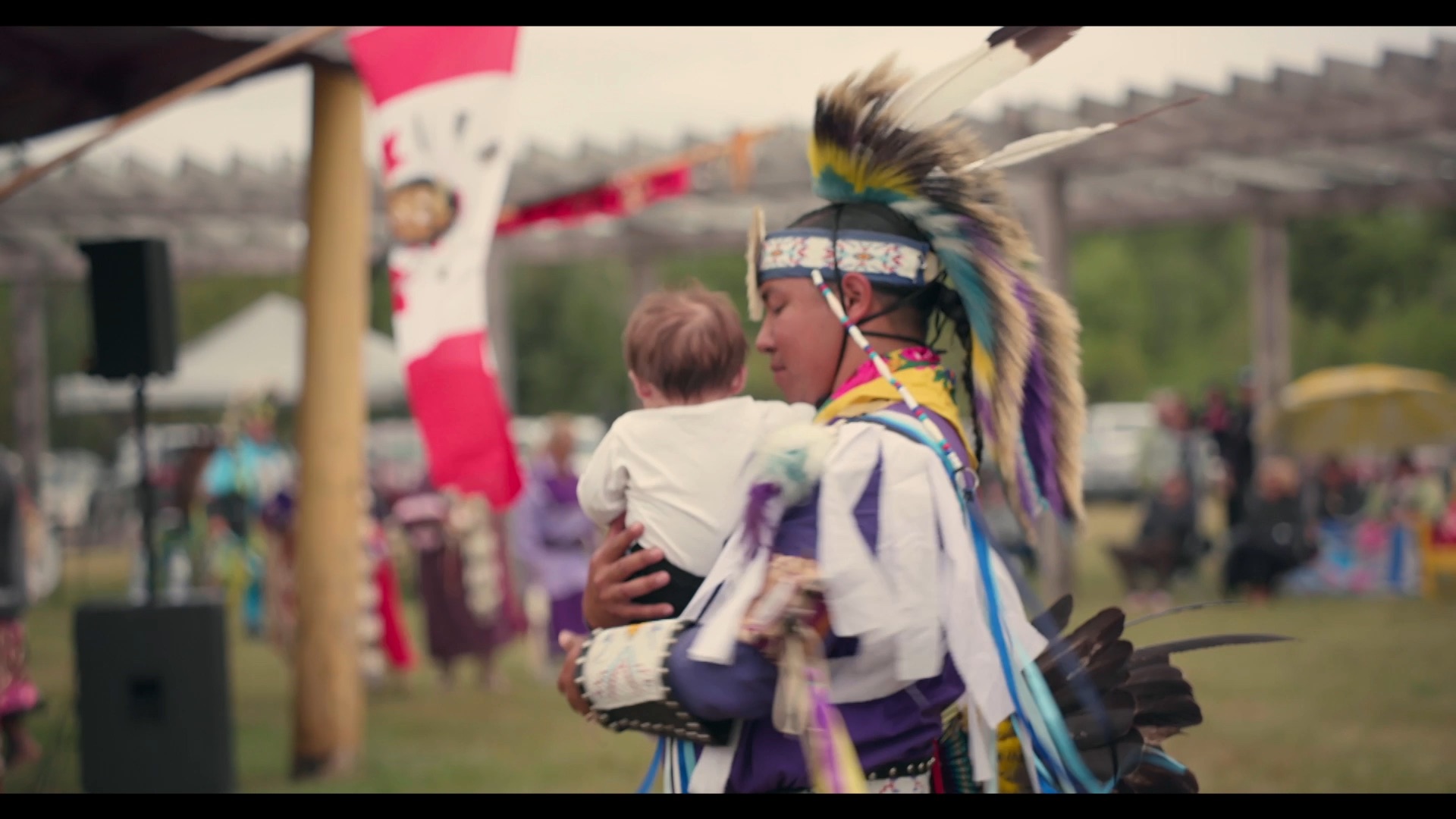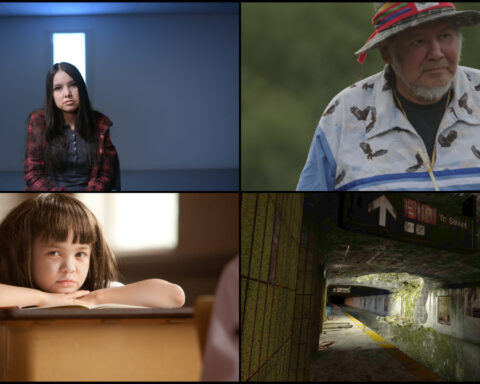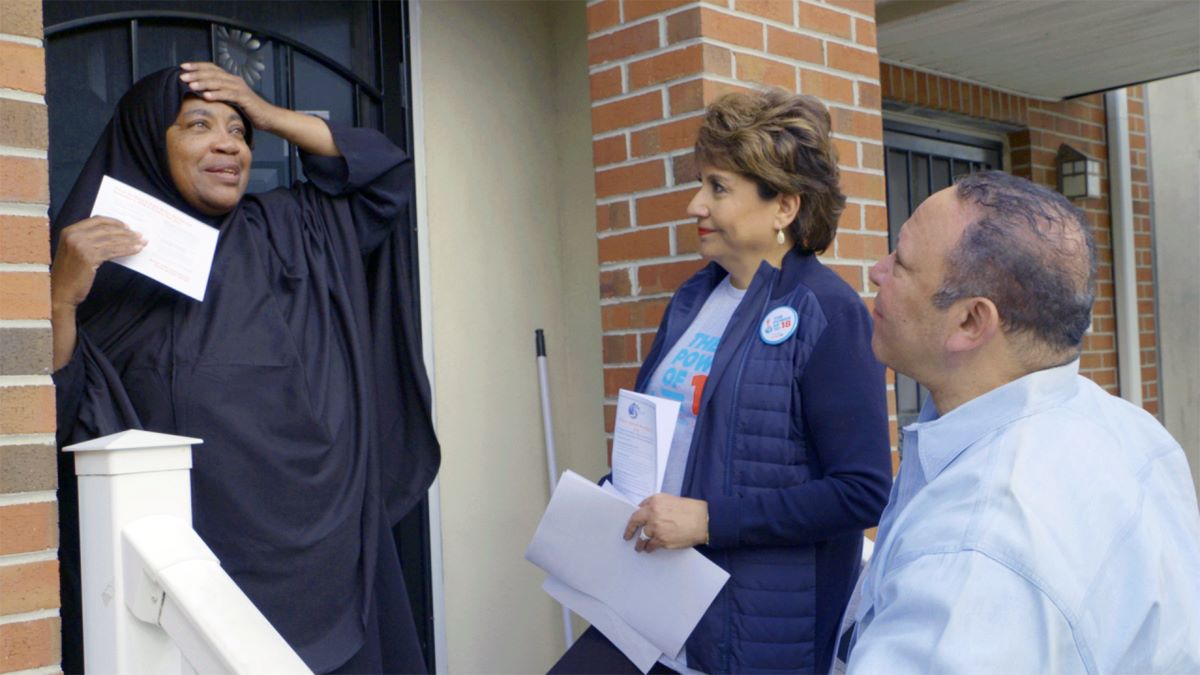Today is a day for reflection. September 30th marks National Day for Truth and Reconciliation, aka Orange Shirt Day. It’s a day to recognize the lives lost and transformed by Canada’s history of residential schools and the lingering effects of colonialism on Indigenous people in Canada that continue to this day. The residential schools have been the subject of numerous documentaries recently, as have been stories of trauma and resilience. These films look at the lives of individuals and families that have been shaped by colonial violence, but they also find hopeful narratives as their subjects work to break the cycle. Here are five films for your consideration for National Truth and Reconciliation Day
Returning Home
Screens for free at Hot Docs Ted Rogers Cinema at 4:00 pm.
Directed Sean Stiller artfully tells the story of Orange Shirt Day founder Phyllis Jack-Webstad. Returning Home follows Jack-Webstad as she speaks to students at schools across Canada and tells them the story of the beloved orange shirt she proudly wore for her first day of school, only to have it ripped from her upon arrival. The event marked to Jack-Webstad the violence of residential schools as she was literally and figuratively stripped of anything that connected her to home. Stiller situates the Orange Shirt Day campaign within the ripple effects of colonialism by zeroing in on the dwindling salmon population in the Upper Fraser River in Secwepemc territory. The film considers how mutations of colonial violence, like mining, have an impact on Indigenous families by depleting natural resources that have fed them for generations.
“A common notion amongst Indigenous communities is that the amount of violence that the Earth faces is directly correlated to the violence Indigenous people face,” wrote Erica Commanda in a feature on Returning Home for POV #116. “When Indigenous people were being displaced and cordoned off on reserves, the health of the salmon population suffered. There was a call to action from one of Phyllis’ family members for society to start listening to Indigenous people for their vast and intimate knowledge about how to live on land and water, and follow the teachings of the seven-generations rule.”
For Love
Available on Netflix
While the last residential school in Canada closed in 1996, a generation of children remains separated from families because of the lateral violence of the institutions. Directed by Matt Smiley and produced by Mary Teegee, executive director of Carrier Sekani Family Services, For Love highlights the plight of over 29,000 Indigenous children in Canada’s child welfare system. The number is hugely disproportionate and reflects the trauma that many of the kids’ parents face as a direct result of the residential schools. Narrated by Shania Twain, For Love succinctly recaps the history of the residential schools system and the policy that gave rise to it. Smiley connects this violence to contemporary events, like the pollution of drinking water on reserves, the rampant cases of suicide within Indigenous communities, and the effects of substance abuse to which people turn to self-medicate in the absence of support systems.
While For Love is admittedly quite heavy with its stories of loss, it finds notes of optimism in the stories of young people who are changing the narrative. Sure to win over audiences is the story of Samantha Metcalfe and Cailyn Degrandpre. The two young Inuit throat singers give voice to their ancestors, and to a new generation of youths, as they harness the art form and share it with the world. While there’s footage of their viral performance for Prime Minister Justin Trudeau, For Love features the two girls, giggles and all, in a new performance in which they face each other in the traditional call-and-response format and their breath lingers in the chilly air.
The Pretendians (The Passionate Eye)
Sept. 30 at 9 p.m. (9:30 NT) on CBC and available now on CBC Gem
Drew Hayden Taylor (Cottagers and Indians) and Paul Kemp (Nike’s Big Bet) tackle one of the most hot-button topics of the day: “pretendians.” The doc examines cases where individuals ranging from prize-winning authors to acclaimed filmmakers have gained considerable authority as Indigenous storytellers despite not being Indigenous. The doc asks why non-Indigenous people might falsely present themselves as Indigenous and prosper in their careers when Indigenous artists struggle. The film looks at the complexity of investigating and establishing a claim of Indigenous identity, particularly when the violence of residential schools means that individuals can’t easily trace their family trees. The Pretendians promises to be one of the more provocative docs about the pervasive, often invisible forms of violence that linger from the residential schools.
True Story
Sept. 30 at 9:00 pm on History Channel
This two-hour documentary unpacks the truths and misconceptions about the history of Indigenous people on this land. Narrated by Kaniehtiio Horn and produced by Eagle Vision, which recently co-produced the acclaimed Buffy Sainte-Marie: Carrie It On, True Story examines the fraught relationship between Indigenous people, settlers, and the land. Director Dinae Robinson features interviews with contemporary Indigenous voices who correct history and speak to the role of narrative sovereignty in charting the path forward. True Story takes an intersectional approach and highlights the roles of women and Two-Spirit voices in history, which further underscores the one-note patriarchal narrative the exists in the dusty old books that tell Canada’s story.
Honour to Senator Murray Sinclair, Alanis Obomsawin, provided by the National Film Board of Canada
Honour to Senator Murray Sinclair
Now available via the NFB (watch above)
Alanis Obomsawin salutes Senator Murray Sinclair, who faced the enormous task of chairing the Truth and Reconciliation Commission. The short features Senator Sinclair as he addresses an audience upon receiving the 2016 WFM-Canada World Peace Award. Obomsawin weaves Sinclair’s words of wisdom amid archival materials highlighting the children lost to residential schools as well as heartfelt testimonies of survivors during the Truth and Reconciliation Hearings. However, Sinclair’s remarks do not speak from a place of anger—although there’s understated rage laced within his eloquent words—and he instead addresses the audience with a message of hope that draws upon the failures of past generations to learn from their mistakes. As Sinclair synthesizes the complicated past to help the audience make sense of the present, his speech encapsulates much of what Obomsawin has also been confronting in her most recent body of work. The task of reconciliation is unduly burdened upon children, but they offer the greatest hope for achieving it. The message of peace within this film should help guide us all forward.














